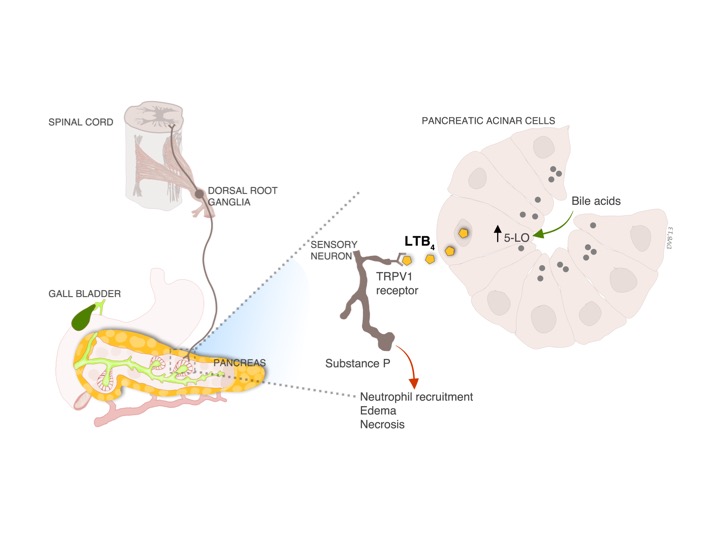Overview
Research Interests
Enteroendocrine Cell Biology
Enteroendocrine cells (EECs) are sensory cells of the gut that send signals throughout the body. They have the ability to sense food and nutrients in the lumen of the intestine and secrete hormones into the blood. Our laboratory has had a longstanding interest in two types of EECs that regulate satiety and signal the brain to stop eating. Cholecystokinin (CCK) is secreted from EECs of the upper small intestine and regulates the ingestion and digestion of food through effects on the stomach, gallbladder, pancreas and brain. Peptide YY (PYY) is secreted from EECs of the small intestine and colon and regulates satiety. We recently demonstrated that CCK and PYY cells not only secrete hormones but are directly connected to nerves through unique cellular processes called ‘neuropods’. Our laboratory has conducted pioneering studies to characterize the structure and function of neuropods and have proposed novel and creative studies that will characterize a new concept for how enteroendocrine cells communicate with the nervous system. This newly discovered neural circuit is a point of communication between food and bacteria in the gut and the nervous system and has been referred to as the first step in the gut connectome. Our laboratory is devoted to understanding EECs signaling and its role in disease.
Pancreatitis
Pancreatitis is an inflammatory disease of the pancreas compounded by intrapancreatic activation of digestive enzymes. Our laboratory is studying the mechanisms involved in the development of pancreatitis. These studies have defined the importance of endogenous pancreatic secretory trypsin inhibitor PSTI (also known as serine protease Kazal type – SPINK) in the generation and prevention of pancreatitis. We have also described the importance of neurogenic inflammation in the initiation of pancreatitis. We have demonstrated that primary sensory neurons play a key role in acute pancreatitis and that the cation channel TRPV1 is a key mediator of pancreatic inflammation resulting from most causes clinical pancreatitis including alcohol and gallstone pancreatitis. We have identified the endogenous activator of TRPV1 and have evidence these mechanisms are relevant to human pancreatitis. Recently, we identified a mechanically activated ion channel Piezo1 in the pancreas that mediates pressure-induced pancreatic injury. We believe this is the mechanism for trauma, surgery, ERCP, and gallstone induced pancreatitis. Our goal is to identify novel targets for treating acute pancreatitis.

Grants
“Mechanisms of mechanically-induced acute pancreatitis” - NIH
“The Role of Gut Endocrine Cells in Parkinson's disease" - NIH
“Gut Neuroendocrine Cell Signaling” - VA
"Metabolic regulation of pancreatitis" - NIH
Lab Members
Rodger Liddle, MD
Primary Investigator
Joelle Romac, PhD
Senior Research Scientist
Sandip Swain, PhD
Assistant Professor in Medicine
Steven R. Vigna, PhD
Associate Professor of Cell Biology and Medicine
Katherine Chavez
Research Project Manager
Beilei Lei, PhD
Lab Research Analyst II
Former Lab Members
Diego Bohorquez, PhD
Christi Ballard
Bryant Beebe
Yu Wang, PhD
Alan Erdmann, MD
Fariha Haque
Mash Haque
Anthony Therattil
Alex Kreger
Supriya Davis
Brian Fee, PhD
Barry Gooch, PhD
Lee Ann Samsa
M. F. Majeed
John Humphrey, MD
Marc Noble, MD
Michael Peyton, PhD
Jaimie Nathan, MD
Akash Patel, MD
Lee Ann Scott
Jasmine Hayes
Laine Hurst
Ala Sharara, MD
Nicholas Snow, MD
Yoshifumi Higashimoto, MD, PhD
Ernest Bouras, MD
Paul Yudelman, MD
Shuji Kanayama, MD, PhD
Tom Geracioti, MD
Robert Rushakoff, MD
Randy Taplitz, MD
Jacqueline Carter
Carol Conrad
Rafiq Shahid, MD
Ahmad Farooq, MD
Stephanie King, MS
Lili Hernandez, PhD
Rashmi Chandra, PhD